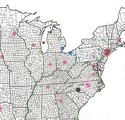There’s an established image in the collective imagination of the kinds of places artsy types tend to live: the painter in a Paris garret, the actor in a Brooklyn brownstone, the musician in a San Francisco Victorian, or the playwright in a fisherman’s shack on Cape Cod. It’s all very romantic. We currently associate these places with vacation destinations and cutting edge high culture so of course that’s where the avant garde would naturally congregate. But people forget that in their day these were the cheapest least desirable locations available. read more »
City and Suburb 2010-2013
Three years is a short time, but perhaps enough to give a sense of what is happening to US metropolitan areas. For both reasons of less uncertainty (and less work for me), I look at just the 107 US metro areas with 500,000 or more people in 2013. These regions house 213 million, two-thirds of the population. I look at the populations of core cities and their suburbs, comparing amounts and rates of change, with further comparison by population size and by region. read more »
The Demographics That Sank The Democrats In The Midterm Elections
Over the past five years, the Democratic Party has tried to add class warfare to its pre-existing focus on racial and gender grievances, and environmental angst. read more »
Los Angeles: Rail for Others
A few years ago, the satirical publication, The Onion ran an article under the headline "98 Percent of US Commuters Favor Public Transit for Others." The spoof cited a mythical press release by the American Public Transit Association (APTA), in which Lance Holland of Anaheim, California said "Expanding mass transit isn't just a good idea, it's a necessity," Holland said. "My drive to work is unbelievable. read more »
Choosing Fortune Over Freedom
“If the 19th [century] was the century of the individual (liberalism means individualism), you may consider that this is the ‘collective’ century, and, therefore, the century of the state.”
Benito Mussolini, “The Doctrine of Fascism” (1932), translated by Barbara Moroncini.
Where goes the 21st century? Until recently, it could be said that, with the defeat of fascism, in 1945, followed by the collapse of the Soviet Union about a half century later, that we had seen the demise of what the Italian dictator Mussolini envisioned as “a century of authority.” But, now, liberalism’s global triumphal march, as was so brazenly predicted in some corners just two decades ago, seems to have slowed, and may even be going into reverse. read more »
Trustafarians Want to Tell You How to Live
Americans have always prided themselves on being a nation of the self-made, where class and the accident of birth did not determine success. Yet increasingly we are changing into a society where lineage does matter—and likely this process has just started, threatening not only our future prosperity but the very nature of our society.
In some ways the emerging age of inheritance stems from the success Americans enjoyed over the past half century. Think not only of the wealthy entrepreneurs, but the vast middle class that purchased their homes, often for what in hindsight look like very low sums, and which now can be sold at massively higher prices. read more »
Aging America: The U.S. Cities Going Gray The Fastest
For years we have been warned about the looming, profound impacts that the aging of the U.S. population will have on the country. Well, the gray wave has arrived. Since 2000, the senior population has increased 29% compared to overall population growth of 12%. The percentage of Americans in the senior set has risen from 12.4% to 14.1%, and their share of the population is projected to climb to 19.3% by 2030. There are two principal causes for this: the baby boom generation is reaching 65 years old, while the U.S. read more »
- Login to post comments
Brain Drain Hysteria Breeds Bad Policy
Desperate times call for desperate measures. The Rust Belt, a region familiar to the air of anxiety, knows this all too well, particularly the “desperate measures” part.
A case in point: During the 1990’s, Pittsburgh, like many of its Rust Belt peers, was in the midst of a fit of brain drain hysteria. Strategic policy was needed. So the powers that be thought of a marketing campaign meant to saturate the minds of the educated “young and the restless” who were thinking about exiting the Steel City. read more »
- Login to post comments
New Zealand Seeks to Avoid "Generation Rent"
The political leadership and others in New Zealand are talking about the consequences of its land use policies. Under the "urban containment" land use policy (also called by terms like "smart growth," "growth management," and "livability") in effect in every urban area, house prices have doubled relative to incomes over the last 25 years. read more »
- Login to post comments
Silicon Valley's Chips off the Old Block
Silicon Valley long has been hailed as an exemplar of the American culture of opportunity, openness and entrepreneurship. Increasingly, however, the tech community is morphing into a ruling class with the potential for assuming unprecedented power over both our personal and political lives. read more »





















